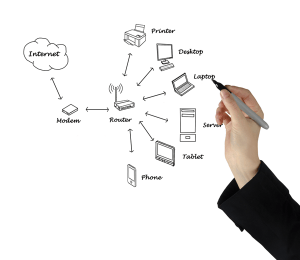What’s IPV6 and should I worry?
 What’s IPV6 and should I worry? A member asks…
What’s IPV6 and should I worry? A member asks…
My company IT guys said that IPV6 is being activated today, and they are going to be upgrading equipment to work with it. That’s fine for my office, but do I need to do anything about this for my home network?
The short answer is that you don’t need to worry about it. At some point in the future, your Internet Service Provider (ISP) may require you to get an IPV6-compatible router, but until then you can just continue to use the one you’ve got – assuming it’s working fine.
 Every single device on the internet has to have a unique address, so that other devices can find it when needed. That includes servers that show websites or applications, computers, smartphones, tablets, smart appliances and more. We’re now even buying light bulbs that have internet addresses!
Every single device on the internet has to have a unique address, so that other devices can find it when needed. That includes servers that show websites or applications, computers, smartphones, tablets, smart appliances and more. We’re now even buying light bulbs that have internet addresses!
For many years now, the internet gurus have been warning that we’re running out of internet addresses – these are Internet Protocol (IP) addresses, a set of numbers that identifies a specific computer or device to the world. We’ve been using IP addresses based on the IPV4 protocol, which follow the format xxx.xxx.xxx.xxx – four sets of three numbers (with some limitations). That gives us about 4.3 billion unique addresses. And yes, we’ve run out of those – we have over 15 billion internet-connected devices on the planet now, and are quickly growing. It has helped that there are reusable private addresses in use, managed by routers (like your home router), but even with that we’re at the point where we can’t continue to use the IPV4 addressing scheme anymore.
Cue IPV6 – a new and much more robust numbering scheme that has about 340 trillion trillion trillion unique addresses following the format of eight sets of 4 alpha-numeric characters, xxxx:xxxx:xxxx:xxxx:xxxx:xxxx:xxxx:xxxx. That should be enough to keep us going for a good while: each person on the planet could have billions of internet addresses without running out! It’s been rolling out for several years now, but you probably haven’t noticed, since it all happens behind the ‘curtain’ so to speak. We continue to find websites by typing their URL, such as https://positek.net instead of having to type a set of numbers. The translation of the URL into and IP address is handled by other computers on the internet – domain name servers. These DNS devices are in use all over the world and there’s a lot of them, and since a lot of IP addresses are changing, they get updated a lot. You don’t have to worry about that though, as long as you can type in a URL and see a website pop up.
So let the engineers and IT professionals worry about getting IPV6 implemented, and don’t worry about your home network – until your ISP tells you!
This website runs on a patronage model. If you find my answers of value, please consider supporting me by sending any dollar amount via:
or by mailing a check/cash to PosiTek.net LLC 1934 Old Gallows Road, Suite 350, Tysons Corner VA 22182. I am not a non-profit, but your support helps me to continue delivering advice and consumer technology support to the public. Thanks!






